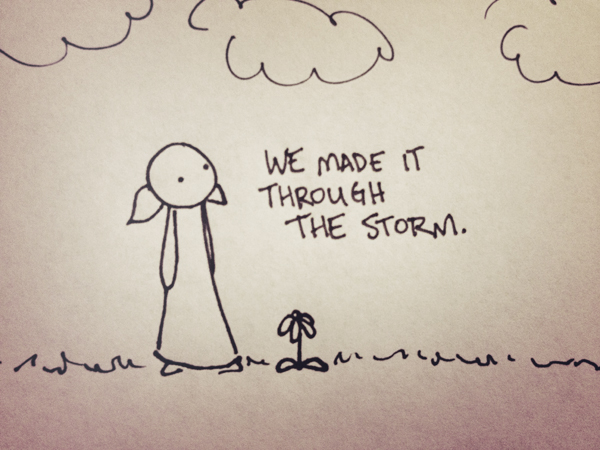To anyone unfamiliar with the album, "The Black Parade" is one hell of an emotional punk rock opera. But it is first and foremost a story. The album follows the story of "The Patient," a character who is dying of cancer. During the album, "The Patient" dies, arrives in the afterlife, where he promptly reflects on his life. MCR manages to tell this story through the 12 songs on the album.
During the music video performances and concert tour for the album, the band ditched their band status, and took on the identity of "The Black Parade." Clad in black & white striped marching band uniforms, My Chemical Romance performed as "The Black Parade." As "The Black Parade" the band breathed life into the "Patient's" story, almost acting as a narrator of the "Patient's" experiences. They are literally his voice.
By choosing to take on this new identity for a year, My Chemical Romance completely transformed their fan base. I suppose it started with them selling "Black Parade" merchandise on their webpage, but eventually, "Black Parade" costumes and gear began showing up in mall retailers such as Hot Topic. When I first saw "Black Parade" merchandise in my local Hot Topic at the mall, I remember thinking, "it's like their videos and story has literally come to life. Now, I can be a part of the phenomenon, too."
At the time, I never realized any of this was the embodiment of a rhetorical vision, the idea of a "composite drama that catches up to a large group of people into a common symbolic reality." (Sellnow, 100) In my opinion, MCR's Black Parade "MCRMY" the name given to the collective of fans, was more of an embodiment of a rhetorical vision then Lady Gaga's little monsters, or Justin Beiber's Beliebers could ever be. MCR fans not only were extremely loyal to their fans, but they would sometimes come to the shows in the same costumes, the band was wearing. Some fans went so far as to dress up as members of "The Black Parade," or the "Patient" for Halloween. Fans who dressed up as the "Patient" or "The Black Parade" dressed up as those icons because they felt a part of something that was more than just songs on album. We all felt that behind all the happy, upbeat joys of life, tragedy exists. We understood that MCR was being ironic by parading around as "The Black Parade" mocking the idea that parades are automatically happy events. Fans who followed the band semi-religiously during that time period were a part of the "shared group conciousness." (Sellnow 102 )
Some fans even renamed their MySpace accounts song lyrics from the album. At one point during this phenomenon, I even changed my MySpace name to read "Savior of the Broken" referencing lyrics from the lead single "Welcome to the Black Parade." Only fans of the album/band would have understood that reference. If I had told a non-fan that was my MySpace name, they wouldn't have understood why naming my MySpace that was such a big deal. This is evidence of the shared group conciousness.
There were even "founding fantasy" stories circulated within some yahoo! groups about the inception of The Black Parade and how they came to be.
"The Black Parade" phenomenon also resulted in bands like Black Veil Brides emerging "in costume" producing rock opera albums that tell a story. Black Veil Brides did this on their 2013 release "Wretched & Divine." Rock band, New Years Day, who modeled their band after "The Black Parade" from a female fronted perspective. During the 2016 10th year anniversary, New Years Day covered their song "Sleep."
It is also important to note that the album existed in one of the five stages in the rhetorical vision life cycle. The album has conciousness sustaining. Everytime you listen to it, it still feels fresh. You may have listened to the album 100x but there's something empowering about knowing that the Patient, who has been to hell and back makes it through every time.



